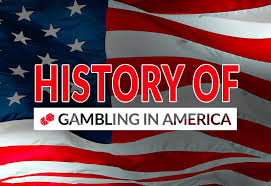
Forbes states that Americans legally gamble $900 billion per year. Even though risking money on an event with an unpredictable outcome is irrational, gambling is here to stay and many Americans try their luck in casinos like Gclub. But when did gambling in the US start?
Gambling came to the British-American colonies with the first settlers. People from different states had various attitudes towards games of chance at the time. But what was common for all is that there were zero regulations or restrictions regarding where and how to play. By the 1680s, a group of wealthy Virginian landowners made elaborate rules and developed a code of honor regarding the size of bets, personal relationships, and so on. Around 400 lotteries existed during the Colonial period.
During the next couple of hundred years, New Orleans was the gambling capital of the US. That was a challenging period for the industry due to constant religious attacks. During the Second Great Awakening and the Third Great Awakening, multiple gambling-restricting laws were passed. However, gambling was getting more and more popular.
San Francisco managed to steal the New Orleans title during the California Golden Rush but not for a long while. Because of the political turbulence, games went underground. Gambling was popular on the frontier during the settlement of the West. Almost everyone was involved in gambling.
In the late 19th century, horse racing was a popular but costly hobby for the rich. However, bookmakers were able to reach a wider audience by a system of runners and telegraphs.
Chicago, at the time, was a city of immigrants and large working-class neighborhoods. Gambling was a massive issue in the town, so the government pushed them to geographically-separated red-light streets. That was the era of crooked cops, so both legal and illegal business owners had to spend a considerable percentage of their incomes on bribes. Card games, betting on the dice, and cockfights were the most popular.
Until the 1920th, the majority of the underground establishments were still run by criminals, and the police and officials were covering them up. That situation, together with illegal liquor production, led to emerging of big criminal syndicates.
In 1917, Reformers led by the Protestants passed state laws that closed nearly all the race tracks. Nevertheless, gambling houses, slot machines, betting parlors, and policy games prospered, just as illegal alcohol did. The Prohibition of most alcohol forms was an essential reform for changes in social terms and health terms in America. Horse-racing made their comeback in the 1920s, as state Governments legalized on-track betting as a popular source for state revenue and legalized off-track betting regained its popularity.
During the 20th century, New York, Cleveland, Saratoga Springs were nation centers for various gambling activities.
Legislation in states
Nevada legislated gambling to overcome the Great Depression. In 1931, Most of the forms of gambling got legal to provide revenue for the state. Within some time, the region became interesting for development, and many well-known criminals like Bugsy Siegel started to invest heavily. Cheap airfare and auto access from California made Las Vegas famous quickly and shut down many illegal gambling venues like Galveston.
In 1977, NJ legalized gambling in Atlantic City. Gradually, lotteries became legalized in all parts of the country. In the 21st century, internet gambling has started to win the industry. In 2011, the global online gambling market reached US$34 billion and counting. One of the reason is that restrictions turn many Americans to try their luck in online casinos in Cambodia accepting players from the US.
John Fosdyle is the founder of Web Casino Star. He is a 36-year-old programmer who enjoys golf, cookery, and drone photography. He is tech-savvy and smart, but can also be very nerdish from time to time. He has a degree in computing and obsessed with creating new tech projects and eating pizza.

